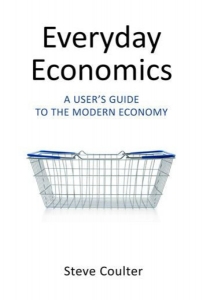Book Review | Everyday Economics: A User’s Guide to the Modern Economy by Steve Coulter
For many of us, economics appears too abstract and rooted in assumptions that make individuals seem unfamiliar as human subjects. In Everyday Economics: A User’s Guide to the Modern Economy, Steve Coulter seeks to tackle these perceptions by offering an accessible take on economics that shows how it has relevance to different aspects of our everyday lives, from health to shopping and housing. Coulter does an admirable job of breaking down barriers to the discipline, finds Barton Edgerton.
 Picture: (Noah Stride CC BY 2.0)
Picture: (Noah Stride CC BY 2.0)
Everyday Economics: A User’s Guide to the Modern Economy. Steve Coulter. Agenda Publishing. 2017.

A little more than ten years ago, the US government declined an opportunity to bail out Lehman Brothers, a 168-year-old investment bank, perhaps deepening a recession that started a year earlier. Few predicted the recession and its exact causes are still a matter of dispute. While one may argue about the specific role the Lehman bankruptcy played, there is little disagreement that the recession – which was deep and wide, impacting large parts of economies across the globe – was a significant hit to the credibility of economics as a profession.
In Everyday Economics: A User’s Guide to the Modern Economy, Steve Coulter recognises this challenge. Early in the book, he notes that on a visit to the London School of Economics in 2008, Queen Elizabeth asked why no one saw the recession coming. It is not a stretch to suggest that the Queen was speaking for most of her subjects as well as for herself. Evidently, the economists gathered didn’t have a very good answer.
Of course, an actual answer might have been unsatisfying to the layperson’s ear. There is a good chance it would have been abstract, complicated and bearing scant resemblance to everyday life. Of course, many economists know this. It was likely an academic economist who first joked that on a desert island, castaways with PhDs from other disciplines would be searching their areas of expertise for ways to open a few cans of food while the economist would just assume a can-opener.
Coulter begins his book by describing his intention to answer two main questions that he believes get to the heart of the Queen’s question: what is the use of economics if it can’t predict the next destructive shock like the recession; and, by extension, how can economics be made more easily understandable? His plan to address each of these is clear and well laid out. The first chapter centres on answering the first question and the seven remaining chapters, each aligned to a topic where economics might improve an individual’s decisions, address the second.
The first chapter is a useful brief survey of the different perspectives through which economics views the world. These range from classical political economy to behavioural economics. Though short and necessarily simple, the introduction is likely to be useful for those unfamiliar with the different approaches. Coulter uses this history as a way to show how the discipline has progressively become less abstract and more focused on concerns that might appeal to an individual. At best, this introduction is likely to give informed readers more questions than answers and pique the interest of those new to the topic.
Subsequent chapters focus on issues that may be of greater interest to the general public. These include education and training; work and occupations; health and healthcare; money, banking and personal finance; housing; shopping and consumption; and benefits and welfare. Each of the seven chapters begins with four key questions to be addressed and a short summary. They consist of four or five subsections, generally two to four pages each, leading to a short conclusion that echoes the summary.
Economics professionals will no doubt have quibbles with the treatment of different aspects of the discipline. However, this book is not directly for them. As Coulter notes in the first chapter, it is rather for those who are curious about the usefulness of economics but are nonetheless unsure based on their experiences during the great recession. As a whole, the book is also wonderfully free of jargon, formulas and acronyms that can be a barrier to those from outside the discipline when trying to engage with economic concepts.
The chapters hit on many of the perennial concerns that face individuals at all levels of the economic ladder. There are, however, a few gaps that are worth noting. Global trade now appears in headlines atop the business and economic sections of major papers, if not on the front page. Trade, per se, gets scant attention in this book. It is a poor fit for the chapters, which are based on meaningful economic decisions that individuals have to make. However, a careful reader might be able to draw a discussion of globalisation from Chapter Five’s treatment of the financial system. There is also a brief account of the importance of global supply chains in Chapter Seven on consumption. However, neither is likely to be helpful to the novice reader who wants to understand how raising tariffs might impact their lives.
However, this omission does not diminish the value of Coulter’s book. Globalisation does play a role in his discussion of work, as do automation and artificial intelligence. This helps to give the reader a sense that global issues can play an important role in their economic lives. Furthermore, the importance of central banks, both domestic and foreign, is nicely woven into a larger story about personal finance. But it is the chapter on work where Coulter shines. Here he is able to subtly bring together concepts of the labour market, wage theory and technology change in a narrative that helps a reader think about their place in the current economy and how that might change in the future.
Early on in the book, Coulter argues that economics is either too abstract to be relevant or makes simplifying assumptions that make individuals seems bizarre and unfamiliar to those with actual experience as human beings. He does an admirable job in doing much to correct these problems. One might wonder if the recession ten years ago could have been mitigated if a lot more people knew a little bit more about economics. It is not a stretch to think that improved economic literacy might do something to reduce the likelihood of a recession as significant as the last. To achieve this, it would seem that economics professionals should seek more interesting and creative approaches and present economic individuals in ways familiar to our daily lives. Everyday Economics makes significant headway in doing just that.
This review gives the views of the author, and not the position of Democratic Audit. It was first published on the LSE Review of Books blog.
Barton Edgerton finished at the LSE in 2009 with a PhD in government. In an academic capacity, he has served as a visiting fellow in the government department at Harvard and as an adjunct in the political science department at Tufts. His research interests focus on the intersection of political theory, international relations and jurisprudence. For the past several years, he has worked in management consulting as an associate director and research consultant working with heads of HR, audit and risk management to help large, global organisations manage their largest strategic risks. Read more by Barton Edgerton.





 Democratic Audit's core funding is provided by the Joseph Rowntree Charitable Trust. Additional funding is provided by the London School of Economics.
Democratic Audit's core funding is provided by the Joseph Rowntree Charitable Trust. Additional funding is provided by the London School of Economics.